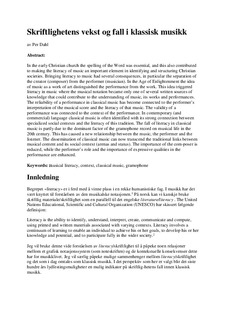Skriftlighetens vekst og fall i klassisk musikk
Journal article, Peer reviewed
Permanent lenke
http://hdl.handle.net/11250/185894Utgivelsesdato
2008Metadata
Vis full innførselSamlinger
Originalversjon
Dahl, P. (2008) Skriftlighetens vekst og fall i klassisk musikk. Studia Musicologica Norvegica, 34, pp. 51-65Sammendrag
In the early Christian church the spelling of the Word was essential, and this also contributed to making the literacy of music an important element in identifying and structuring Christian societies. Bringing literacy to music had several consequences, in particular the separation of the creator (composer) from the performer (musician). In the Age of Enlightenment the idea of music as a work of art distinguished the performance from the work. This idea triggered literacy in music where the musical notation became only one of several written sources of knowledge that could contribute to the understanding of music, its works and performances. The reliability of a performance in classical music has become connected to the performer’s interpretation of the musical score and the literacy of that music. The validity of a performance was connected to the context of the performance. In contemporary (and commercial) language classical music is often identified with its strong connection between specialized social contexts and the literacy of this trad-ition. The fall of literacy in classical music is partly due to the dominant factor of the gramophone record on musical life in the 20th century. This has caused a new relationship between the music, the performer and the listener. The dissemination of classical music can now transcend the traditional links between musical content and its social context (arenas and status). The importance of the com-poser is reduced, while the performer’s role and the importance of expressive qualities in the performance are enhanced.
